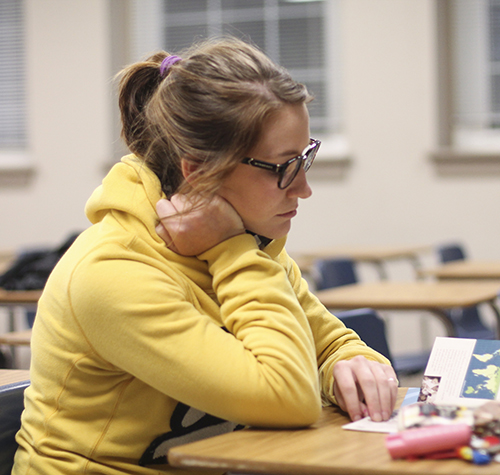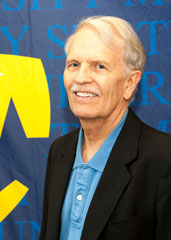
Abigail Spiegel, sophomore from Louisville, Ky., reads a brochure about non-profit organization Catch the Wave.
More than 780 million people around the world have no access to clean water, but an emerging organization on campus is determined to remedy that.
Catch the Wave is a student organization working with Living Waters for the World, a non-profit focused on providing water to poorer areas. Murray State is the only university working with Living Waters for the World.
Catch the Wave serves communities that have available, but contaminated water.
It has developed modular clean water systems to address the specific needs of each community. Systems are commonly installed in churches, hospitals, schools or orphanages because they are central institutional settings.
Bacteria and other impurities are removed from the water through filtration and disinfection processes. Up to 300 gallons of water can be processed per hour by the system.
Roger Weis, professor of education and human services, said Catch the Wave’s main purpose is to generate funds for Living Waters of the World, but students can also volunteer to work with a team.

“It’s going to be a lot of work,” he said. “But it is going to be worth it.”
Weis said Murray State is the ideal place to start and they plan to spread the program to other universities.
Every minute at least one child dies from water-related diseases, according to the World Health Organization.
“It irritates me when a student says there is nothing to do,” Weis said. “There’s lots of work to do. We want to have fun with this, but it has to be taken seriously because people’s lives are being effected.”
More than 570 water systems have been installed by the organization, according to the Living Waters for the World 2013 Annual Report.
This is the organization’s 20th year of service.
Living Waters reported it has trained 1,662 volunteers to properly install the water purification systems. Volunteers are also trained in team leadership, health and hygiene instruction and maintenance of the system.
The operating budget of Living Waters for the World is approximately $700,000 according to the 2013 Annual Report and more than half of its budget is used to fund field operations.
Josh Hawkins, junior from Mayfield, Ky., said he has always had a desire to serve people because it is a passion.
“We’re all on Earth for a reason,” Hawkins said. “We are very fortunate and we need to share with the world.”
Hawkins said he has never traveled internationally, but he would like to spend time serving in other countries.
Living Waters for the World is associated with 25 nations like Guatemala and Ghana.
Abigail Spiegel, sophomore from Louisville, Ky., said Catch the Wave has the capacity to impact thousands of people on various levels.
“Water is a basic need of life and when someone does not have this basic need they cannot give back to their community or take an active role in their own family,” Spiegel said.
Spiegel said giving back to the world changes a person’s mindset and can create an entirely new outlook on life, which she said some college students need.
“We need a reality check of what the rest of the world is going through while we are uploading pictures to Instagram of our pumpkin spice lattes and skipping class because we don’t feel like walking to class,” she said.
Story by Mari-Alice Jasper, Staff writer